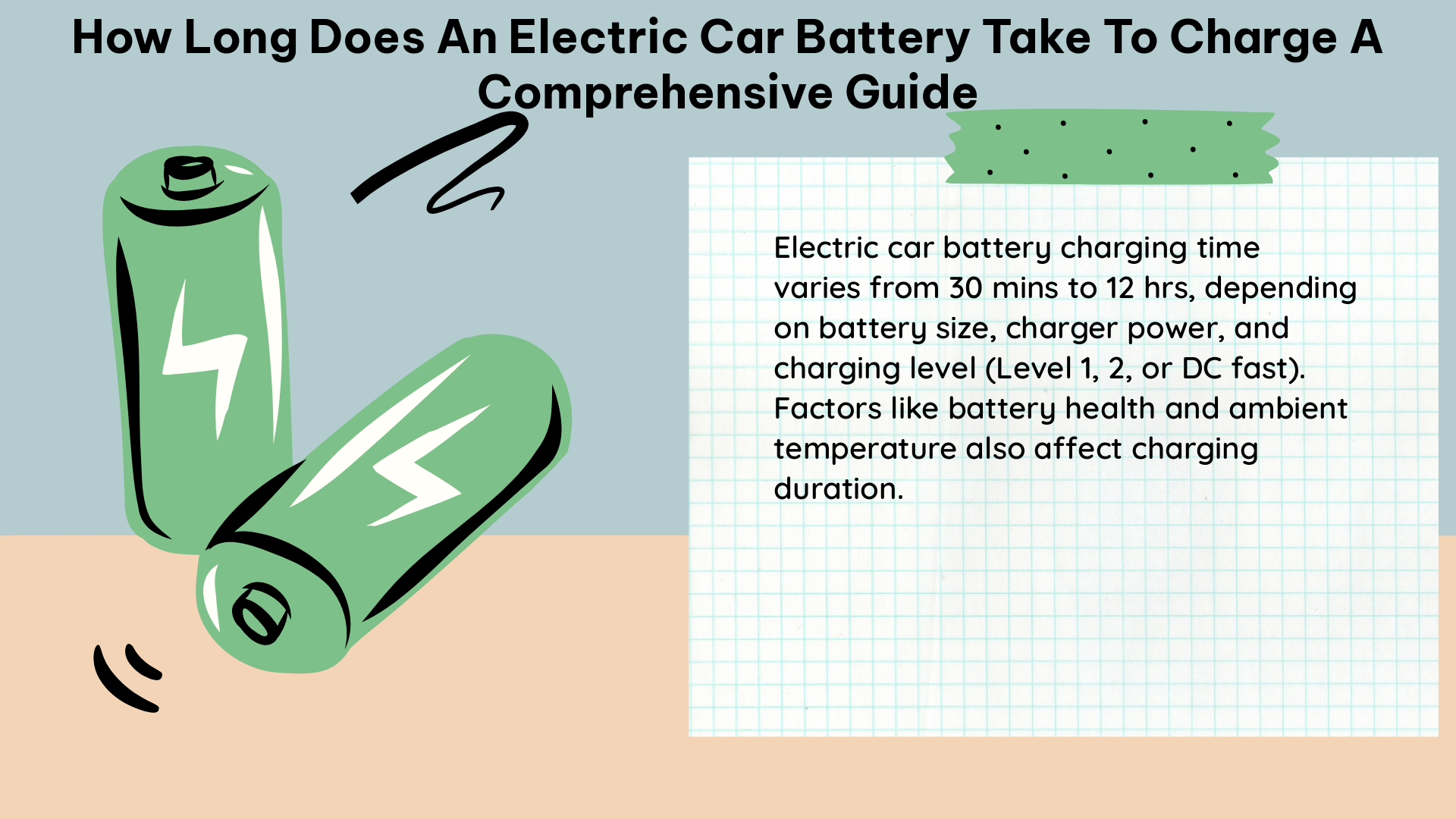When it comes to charging an electric car, there are several factors to consider, including the type of charger, the battery’s size, and the vehicle’s maximum charging rate. Understanding these factors can help you determine how long it will take to charge your electric car battery.
Type of Charger
There are three main types of chargers for electric cars: Level 1, Level 2, and DC Fast Charging.
Level 1 Charging
This type of charging uses a standard household outlet (120V, 15-20A) and adds about 3-5 miles of range per hour of charging. It takes around 40-50 hours to charge a battery electric vehicle (BEV) with a 60-100 kWh battery to 80% from empty and 5-6 hours for a plug-in hybrid electric vehicle (PHEV) with a 10-20 kWh battery.
Level 2 Charging
This type of charging uses a 240-volt outlet, similar to what an electric dryer uses, and adds about 10-25 miles of range per hour of charging. It takes around 4-10 hours to charge a BEV with a 60-100 kWh battery to 80% from empty and 1-2 hours for a PHEV with a 10-20 kWh battery.
DC Fast Charging
This type of charging uses a direct current (DC) charger and adds about 60-200 miles of range in 15-30 minutes. It takes around 20 minutes to 1 hour to charge a BEV with a 60-100 kWh battery to 80% from empty.
Battery Size

The size of the battery also affects the charging time. A larger battery will take longer to charge than a smaller battery. For example, a BEV with a 100 kWh battery will take longer to charge than a BEV with a 60 kWh battery.
Vehicle’s Maximum Charging Rate
The vehicle’s maximum charging rate also affects the charging time. A vehicle with a higher maximum charging rate will charge faster than a vehicle with a lower maximum charging rate. For example, a Tesla Model 3 Performance has a maximum charging rate of 11.5 kW, while a Tesla Model 3 Standard Range has a maximum charging rate of 7.6 kW.
Other Factors
Other factors that can affect the charging time include the age and condition of the battery, the temperature outside, and the condition and age of the charger.
Technical Specifications
When it comes to technical specifications, there are a few key things to keep in mind:
Onboard Charger
The onboard charger in the vehicle converts the AC electricity from the wall into DC electricity to charge the battery. The onboard charger has its own power rating, typically in kilowatts (kW). A higher-powered onboard charger can charge the battery faster.
Charging Efficiency
Charging efficiency is the percentage of electricity that is actually used to charge the battery. A charging efficiency of 90% means that 90% of the electricity is used to charge the battery, while 10% is lost as heat.
Charging Losses
Charging losses are the losses that occur during the charging process, such as resistance in the wires and heat generated by the onboard charger. These losses can reduce the overall charging efficiency and increase the charging time.
DIY
If you’re looking to charge your electric car at home, there are a few things you can do to make the process easier:
Install a Level 2 Charger
Installing a Level 2 charger at home can significantly reduce the charging time. A Level 2 charger can add around 10-25 miles of range per hour of charging, depending on the vehicle’s maximum charging rate.
Use a Smart Charger
A smart charger can help you manage your charging schedule and reduce your electricity costs. A smart charger can also provide valuable data about your charging habits and energy usage.
Monitor Your Battery Level
Keep an eye on your battery level and try to keep it above 20% and below 80%. Charging your battery from empty to full can reduce its lifespan.
References
- How Long Does It Take To Charge an Electric Car? – Kelley Blue Book
https://www.kbb.com/car-advice/how-long-does-take-charge-electric-car/ - How Long Does It Take to Charge an Electric Car? – Car and Driver
https://www.caranddriver.com/shopping-advice/a32600212/ev-charging-time/ - How Long Does It Take to Charge an Electric Car? | U.S. News
https://cars.usnews.com/cars-trucks/advice/ev-charging-time - Charger Types and Speeds | US Department of Transportation
https://www.transportation.gov/rural/ev/toolkit/ev-basics/charging-speeds - How Long Does It Take to Charge an Electric Car? – NerdWallet
https://www.nerdwallet.com/article/loans/auto-loans/electric-car-charge-time

The lambdageeks.com Core SME Team is a group of experienced subject matter experts from diverse scientific and technical fields including Physics, Chemistry, Technology,Electronics & Electrical Engineering, Automotive, Mechanical Engineering. Our team collaborates to create high-quality, well-researched articles on a wide range of science and technology topics for the lambdageeks.com website.
All Our Senior SME are having more than 7 Years of experience in the respective fields . They are either Working Industry Professionals or assocaited With different Universities. Refer Our Authors Page to get to know About our Core SMEs.